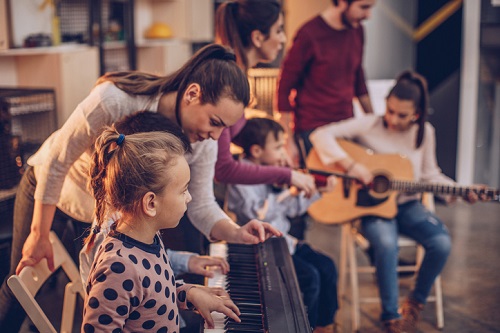
Studies have shown that singing and playing music is one of the most effective ways to help young people learn. The benefits include a longer attention span, emotional stability, resilience and cognitive capacity.
Importantly, this type of education has also been shown to help students progress in crucial learning areas such as English, Science and Mathematics – which have seen a decline in student outcomes in recent years.
One organization dedicated to delivering quality music mentoring to teachers and students is The Song Room, an Australian company established in 2006 whose programs now reach more than 80% of schools and more than one million students.
The Song Room’s DUET program offers schools a Teaching Artist, who can deliver a music education program one day a week. This includes active in-class mentoring, access to digital music education resources via ARTS:LIVE, and a professional learning workshop.
Simon Gipson, CEO of The Song Room, said the program has come at a critical time.
“The grim reality is that for many schools, one of the first programs to go out the back door tends to be an arts program – particularly when there are limited resources and an increasing pressure to deliver on areas such a literacy and numeracy,” Gipson told The Educator.
“The second element in this is that generalist teachers in their pre-service training receive a maximum of 20 hours of arts learning in their course – and that’s across all modalities of arts learning. In Finland, they get about 350 hours.”
Gipson said another important factor to consider is that three out of four primary schools do not have a specialist music teacher.
“What this program provides, free of charge, an experienced teaching artist to come in and work with staff who are looking to build a program around music, but don’t have the capacity and capability to do so,” he said.
“The staff receive one-on-one mentoring across two terms to develop and skill up teachers who will then go on and deliver quality music education.”
Gipson said this process is linked to a vast suite of digital resources that make the resources highly accessible. He said this allows teachers to learn about more technical, pedagogical curricular skills that the teaching artist can introduce them to.
“It is also a resource that teachers can employ at the time but also refer back to and grow and develop their skills through, which comes to them regardless of where they are, because it’s an online tool,” he said.
‘A profound impact on disadvantaged students’
Gipson said a critical factor of the program is that it has been shown to have a profoundly positive impact on the most disadvantaged students.
“Here is a chance to engage these struggling students and ultimately lift their learning outcomes. What principal would not want to see that in their school?” Gipson said.
“Even though this is an opt-in for schools, it is an opportunity for them to work at a system level, and that’s an extraordinary opportunity because it means there is a chance to deliver system-wide change.”
Gipson said there is an increasing expectation on education systems to ensure that students are properly equipped for the 21st century.
“It’s becoming more important for organisations like The Song Room and others to work in strategic partnership with governments to support them in achieving our collaborative goal of supporting the learning of young Australians as best we can,” he said.
To be involved, principals are encouraged to visit www.songroom.org.au/ourprograms/DUETTeacherMentoring and complete an Expression of Interest by 14 December.


